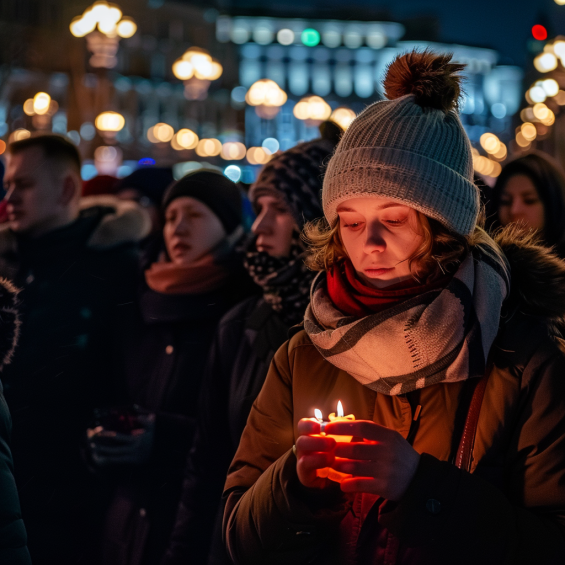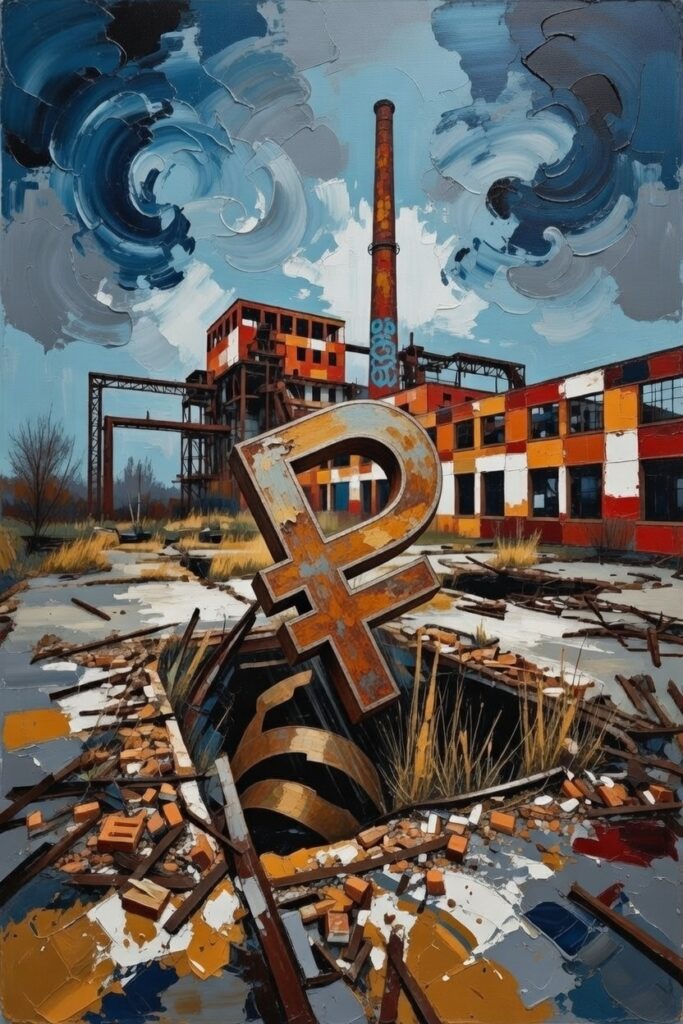The founder of the Anti-Corruption Foundation (FBK) Alexei Navalny has died in the «Polar Wolf» penal colony in the Yamalo-Nenets District, one of the toughest in the country, reserved for particularly dangerous criminals. Russian officials claim the opposition figure suddenly became unwell, allegedly suffering a blood clot, and doctors were unable to help him. Propagandists, pro-Kremlin politicians, as well as Russian officials and law enforcers, who speak to reporters on condition of anonymity, unanimously assure that «the Kremlin does not benefit from Navalny’s death, especially during Vladimir Putin’s election campaign.» It is quite possible to assume that in this particular case they are not lying in the sense that the authorities really did not poison Alexei Navalny this time, nor did they shoot or slaughter him. The «civilians» — members of the presidential administration responsible for the elections and Foreign Ministry officials busy trying to sell the West Russian terms for hypothetical negotiations with Ukraine — have little to gain from the opposition figure’s death.
In political pragmatic terms, it creates a completely unnecessary background for Putin’s campaign, distracts from it, and once again shows the West that Putin is not a special «sovereign conservative» with whom it is possible to talk, but a real dictator who physically eliminates his opponents.
Even if we believe the official version, Alexei Navalny was in fact killed by extremely difficult conditions of detention: he was constantly sent to a punishment cell and kept in the cold. The oppositionist was often and repeatedly seriously ill. The heads of the Federal Penitentiary Service and the Kremlin received constant complaints from Navalny himself, his lawyers and doctors, but did not react to them in any way. The oppositionist was literally driven to death.
The murder (instant or delayed) of Vladimir Putin’s main political opponent in prison, that is, in a territory completely under the control of the authorities, is a terrible evidence of the regime’s final mutation into a terrible direction. Previously, Putin’s power vertical did stick to political pragmatism and did not undertake any steps that would be «unfavourable» for itself. Businessman Mikhail Khodorkovsky was arrested, his company YUKOS was destroyed but the Kremlin kept Khodorkovsky in prison, maintaining the illusion of its own power. The alleged message was as follows: «We don’t destroy our enemies completely, we leave them alive.» Khodorkovsky was released in 2013: the regime wanted to appear freer on the eve of the Sochi Olympics. Political assassinations have always been blamed on the entourage of Chechen head Ramzan Kadyrov, whom the Kremlin has little control over. The death of the main opposition figure, whose detention is monitored by foreign countries, in a prison where the authorities can ensure full control, simply does not fit Kremlin’s earlier style of behaviour.
The former Kremlin would have kept an eye on Navalny and most likely would have prevented his death during the «election campaign» and before the end of the war. The former political bloc of the presidential administration would most likely have resisted the wishes of the top leadership and would not have allowed Navalny’s death (the leadership itself also knew how to restrain its own wishes as best as it could). This manageability created the illusion of power: «We defeat our enemies, but we do not destroy them completely, because we can afford not to».
Now the regime and Putin himself have stopped calculating «favourable» scenarios for themselves. Alexei Navalny has been sent to die a slow and painful death in the «Polar Wolf» penal colony, his health constantly deteriorating undermined by harsh conditions of his detention [amounting to torture]. The regime hoped that at strategically important moments (during the election campaign or attempts to put extra pressure on the West during negotiations) Navalny will for some reason be still alive and, better still, healthy. The prominent pro-Kremlin media managers are almost openly rejoicing at Navalny’s death, and even hinting at joy among the top officials whose corruption Navalny had exposed. At the same time, the Foreign Ministry and Kremlin officials are now trying to save face and deny everything. Putin’s press service announces some sort of statement from him on what happened, but the president, who according to the same service is «informed», listens to the students’ thanks with a broad smile on his face. It is likely that he is satisfied with what has happened although for someone posing as the self-proclaimed «leader of oppressed countries, as well as all traditionalists and conservatives around the world» his behavior looks petty and undignified. However, the regime cannot show its strength; it is waving away the «black swan» it has nourished. Tragically, the death of Alexei Navalny, the most prominent public politician and oppositionist, is too high a price to pay for seeing this weakness, the inconsistency between the actions of the power vertical and its first person.
Nadezhdin at a crossroads
Following the failure to be registered as a presidential candidate, politician Boris Nadezhdin found himself in a difficult situation. Two paths have opened up for him that carry the same risks for his future career, but at the same time offer roughly comparable advantages in terms of political pragmatism. He went from being a «whipping liberal» invited to TV shows specifically to be publicly attacked and ridiculed, and a municipal deputy from the Moscow region to being a politician with federal fame and an approval rating of around 10%. His extensive political experience (Nadezhdin has been involved in the democratic movement and politics since the late 1980s) allows him to keep a clean record, make decent public appearances and attract interest even after his withdrawal from the presidential campaign. Nadezhdin claims that he is planning on suing the Central Election Commission and makes announcements about his future political career. These announcements are rather vague, however, precisely because Nadezhdin has not yet clearly chosen the path he will take.
The first path is straightforward and clear. The politician can continue to criticise Putin, oppose the war and call it Putin’s main mistake. These slogans made Nadezhdin the only anti-war candidate allowed to collect signatures in support of his presidential campaign. The media activity of popular opposition politicians, bloggers and independent experts drew the public’s attention to these slogans. The combination of two factors (the monopoly on anti-war rhetoric and the appeals of prominent opposition figures) allowed Boris Nadezhdin to quickly collect signatures and build up his rating. As it turns out, simple slogans work well in the ringing void of Russian politics, where the systemic parties and their representatives do not seriously criticise Putin and the war. Nadezhdin could take a risk and use this anti-Putin and anti-war platform to promote the Civil Initiative party, of which he is a member. Judging by Nadezhdin’s own rating (at the end of January it was around 8%, higher than that of the parliamentary candidates), the Civil Initiative’s rating could exceed that of the Communist party, the Liberal-Democratic party and the New People party. If Nadezhdin and his Civil Initiative were to make it to the 2026 Duma elections, they would have constituted a solid parliamentary fraction. But the likelihood of the Kremlin allowing Boris Nadezhdin to maintain his monopoly on anti-war and anti-Putin rhetoric is close to zero. It is unlikely that the presidential administration plans to dismantle the party system and create something new (and anti-war) in its place employing Nadezhdin for this job. Therefore, in case this politician continues this kind of activity he is very likely to end up behind bars. Nadezhdin can choose another option on this path: to leave the country and continue to criticise Putin and the war he started from abroad. In this case, the politician runs the risk of falling out of the usual political systemic circuit.
The second path is for Nadezhdin to become part of the system and continue his career within it, which is what Nadezhdin has done before. The politician has already taken the first steps in this direction. He has renounced the ‘Maidans’ (a reference to protest rallies in Ukraine in support of democracy) and announced that he will only challenge the refusal to register in court (the Supreme Court has already turned down his appeal). Besides, Nadezhdin is currently conducting cautious negotiations with the New People’s party: its candidate, the deputy chairman of the State Duma, Vladislav Davankov, has given his signature in support of Nadezhdin’s candidacy. Davankov has also publicly stated that he is ready to include points from Nadezhdin’s election programme in his own, and has even postponed its presentation for a few days. Nadezhdin could start campaigning for the New People candidate by going on a regional tour with him. According to Kommersant newspaper, the politician has been offered a district to win in the Moscow City Duma elections in exchange for his cooperation. But so far, the politician is clearly cautious: he refuses to publicly cooperate with Davankov, and is busy weighing all the pros and cons.
Vladislav Davankov is young and ambitious, he does not want to finish last in the elections, and winning over even a small portion of potential voters who were meant to support the «people’s candidate» would protect him from being an outsider. But there are risks involved for both Nadezhdin and Vladislav Davankov. To win the sympathy of Nadezhdin’s supporters, the New People’s candidate will have to voice at least some criticism of Putin and the war. This move is unlikely to be coordinated and approved by the Kremlin (Davankov worked as deputy director of one of the main structures of the presidential administration’s political bloc «Russia - Land of Opportunities»). On the contrary, the Kremlin is likely to ask the New People’s candidate and long-time partner to influence Nadezhdin not to touch the subject of the war, not to insult Putin, and to renounce his support group from the non-systemic opposition.
It remains to be seen how productive this interaction between the young «technocrat from politics» and an old liberal will be. This is the big question. The sum of their wills and their extremely delluted rhetoric may add up to zero. The public opposed to the regime will see Nadezhdin become a yet another «Kremlin man». Its most radical part may think that the politician was nominated by the Kremlin from the very beginning in order to dispose of the electorate in favour of Davankov (which is not true). Excessive conformity can alienate even the moderate voters, and in such a case it is hardly possible for him to win even in the Moscow City Duma district, which has been cleared for the taking and agreed upon. People will vote for an anti-war candidate, but they won’t vote for a «traitor.»
Thanks to his rich experience, Nadezhdin understands this well. Judging by his behaviour, he is beginning to like the status of the country’s second politician and does not want to give it up. He is playing for time, trying to find an acceptable and safe way to get out of the tight spot. And it is quite likely that he will find it by trying to take the second path, preserving his ability to somehow bash Putin and getting a licence to mildly criticise the war.










